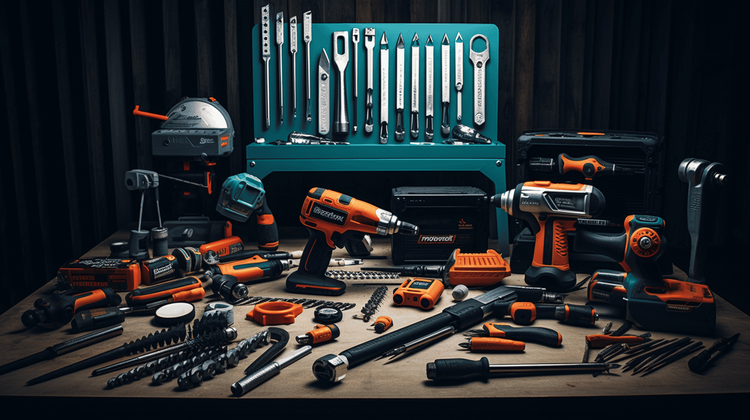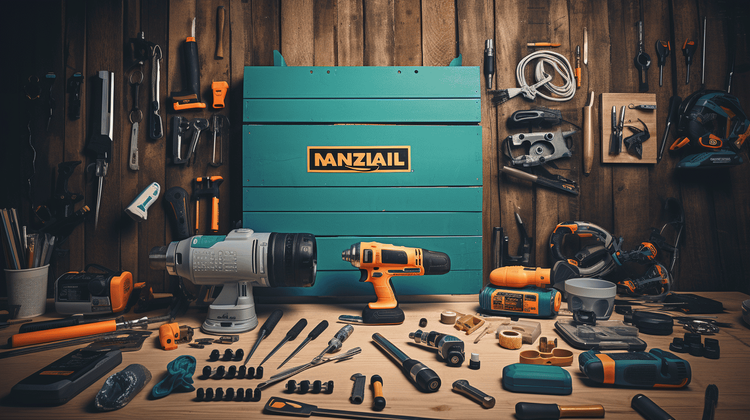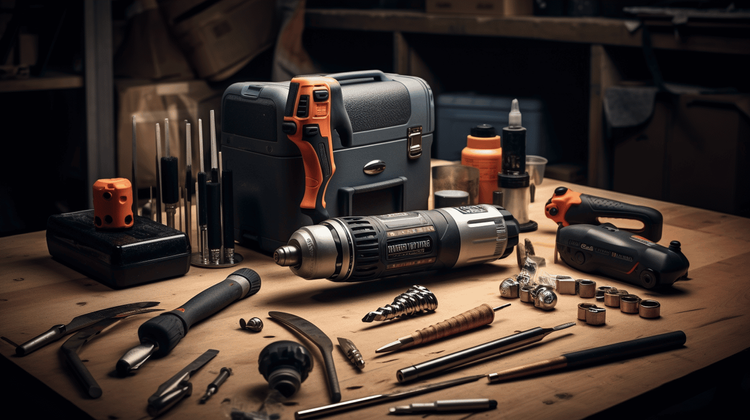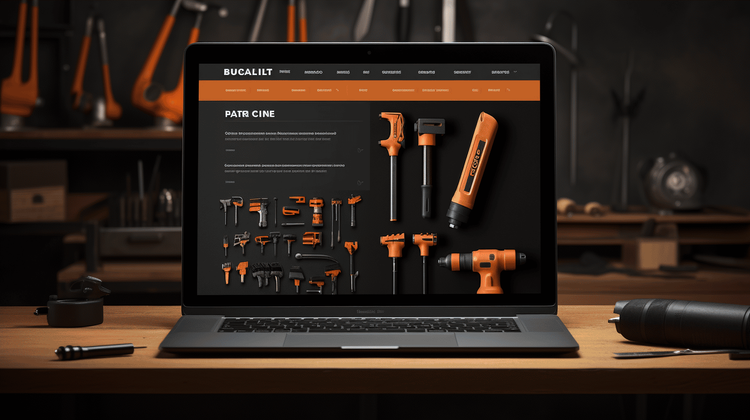The Budget-Conscious DIY Enthusiast's Guide to Finding Bargain Tools

Welcome to the Budget-Conscious DIY Enthusiast's Guide to Finding Bargain Tools! If you love taking on DIY projects but find yourself on a tight budget, this article is for you. We understand that finding quality tools at affordable prices can be a challenge, but fear not! We have gathered some expert tips and tricks to help you navigate the world of bargain tools with confidence.
Whether you're a seasoned DIYer or just starting out, having the right tools is essential to successfully complete your projects. However, investing in all the tools you need can quickly add up. That's where finding bargain tools becomes crucial. By being savvy and doing some research, you can save a significant amount of money without compromising on quality.
In this guide, we'll cover everything you need to know about finding bargain tools. From understanding your DIY needs to evaluating tool quality, from negotiating prices to finding deals and discounts, we've got you covered. We'll also explore alternative tool options and provide tips on maintaining and repairing your bargain finds.
So, if you're ready to become a bargain-hunting DIY enthusiast, let's dive into the world of finding affordable and reliable tools that won't break the bank!
Understanding Your DIY Needs
When it comes to DIY projects, having the right tools is essential. Whether you're a seasoned DIY enthusiast or just starting out, it's important to assess your needs and identify the essential tools that will help you complete your projects successfully. Here are a few key points to consider:
Assessing your DIY projects
Before you start hunting for bargain tools, take some time to assess the scope and nature of your DIY projects. Ask yourself the following questions:
- What type of projects do I typically work on?
- Do I plan on taking on more complex projects in the future?
- Am I working on small repairs or larger renovations?
- How often will I be using these tools?
By understanding the specific tasks you'll be undertaking, you can prioritize which tools are essential for your DIY arsenal.
Identifying essential tools
Once you know the type of projects you'll be working on, it's time to identify the essential tools you'll need. While the specific tools may vary depending on your projects, there are a few basics that every DIY enthusiast should have:
- Hammer: A versatile tool for driving nails and other small tasks.
- Screwdriver set: Includes different sizes and types of screwdrivers for various applications.
- Wrench set: Necessary for tightening and loosening nuts and bolts.
- Saw: Essential for cutting wood and other materials.
- Power drill: An indispensable tool for drilling holes and driving screws.
- Measuring tape: Used for precise measurements in construction and woodworking projects.
- Level: Ensures that surfaces and objects are even and straight.
Different tool quality levels
When it comes to tools, there are different quality levels available, and understanding these levels can help you make informed decisions. Here are three common quality levels:
- Professional Grade: These tools are designed for heavy-duty use and are often used by professionals in their trade. They are built to last and offer superior performance, but they can be more expensive.
- Mid-Range: Mid-range tools are a good option for DIY enthusiasts. They offer a balance between price and quality and can often withstand regular use for home projects.
- Budget-Friendly: Bargain or budget tools are typically more affordable, but they may sacrifice some durability and performance. These tools are suitable for occasional or light use.
Understanding these different levels will help you determine the right quality of tools for your projects and budget.
Remember, finding and acquiring bargain tools is just the first step. In the next section, we'll explore various options for researching and locating these tools at affordable prices.
Researching Bargain Tool Options
When it comes to finding bargain tools, there are a variety of options available to the budget-conscious DIY enthusiast. By doing some research and exploring different avenues, you can uncover great deals on tools without breaking the bank. Here are some tips to help you find the best bargain tool options:
Local hardware stores
Start your search at your local hardware stores. These stores often have sales and discounts on tools, especially during certain times of the year. Keep an eye out for seasonal promotions or clearance sections where you can find discounted tools. Additionally, some stores may have loyalty programs or mailing lists that allow you to receive notifications about upcoming sales.
Garage and yard sales
One man's trash is another man's treasure, and you can often find hidden gems at garage and yard sales. Many people sell their lightly used tools at these sales, often at significantly reduced prices. Take some time to browse through these sales in your area, and you might just find the perfect tool at a fraction of its original cost.
Online classifieds and marketplaces
The internet has made it easier than ever to find bargain tools. Online classifieds and marketplaces like Craigslist, Facebook Marketplace, and eBay are great places to search for used tools. You can often find sellers who are looking to get rid of their tools for a low price. Just be sure to carefully read the descriptions and ask questions to ensure you're getting a good deal.
Discount stores and thrift shops
Discount stores and thrift shops can also be valuable resources for bargain tools. While their selection may not always be as extensive as specialized hardware stores, they often offer great deals on tools. Keep an eye out for these stores during your search, and you may be pleasantly surprised by the quality and affordability of the tools they have available.
Remember, when researching bargain tool options, it's important to prioritize quality over price. While finding a great deal is exciting, make sure the tools you purchase are in good condition and will meet your DIY needs. Take the time to inspect the tools and test their functionality before making a purchase.
Researching bargain tool options may require some time and effort, but it's worth it to find the best deals and save money on your DIY projects. So get out there, explore different sources, and uncover those hidden gems that will help you tackle your projects without breaking the bank. Happy tool hunting!
Evaluating Tool Quality and Condition
When it comes to finding bargain tools, it's important to not only consider the price but also the quality and condition of the tools. After all, you want tools that are reliable and will get the job done effectively. Here are some tips for evaluating the quality and condition of bargain tools:
Inspecting for damage or wear
Before purchasing any used or discounted tools, take a close look at them to check for any visible damage or signs of wear. Look out for the following:
- Rust: Rust can weaken the tool and affect its performance. Check for any rust spots and determine if they can be easily cleaned or if they indicate deeper damage.
- Dents or bends: Examine the tool for any dents or bends that may affect its functionality. Avoid tools with significant damage as they may not work properly.
- Loose parts: Ensure that all parts of the tool are securely attached and not loose or wobbly.
- Cracks or breaks: Look for any cracks or breaks in the tool's body or handle, as these can be safety hazards.
Testing functionality
It's essential to test the functionality of bargain tools before making a purchase. Here are a few ways you can do this:
- Power tools: If you're buying power tools, ask the seller if you can plug them in to test if they are working properly. Check if they turn on, spin, or perform their intended functions.
- Hand tools: For hand tools like hammers, screwdrivers, or wrenches, test how they feel in your hand. Check if they have a comfortable grip and if they seem sturdy and well-made. If possible, try using them on a small project to see how they perform.
Considerations for used tools
When evaluating used tools, keep the following in mind:
- Age and usage: Consider how old the tool is and how extensively it has been used. Older tools may have worn parts that need to be replaced.
- Replacement parts availability: Check if replacement parts are readily available for the tool you're considering. It's important to know if you'll be able to fix or replace any parts that may break or wear out over time.
Remember, while it's great to find a bargain, it's crucial to ensure that the tools you purchase are in good working condition. A broken or faulty tool can be frustrating and even dangerous. So, take the time to thoroughly evaluate the quality and condition of any bargain tools before making your purchase.
"Don't let the allure of a low price blind you to the quality of the tool. It's better to spend a little more for a tool that will last than to waste money on something that will end up being useless."
Price Negotiation and Comparison
As a budget-conscious DIY enthusiast, finding bargain tools is essential to keep your projects affordable. While researching and evaluating the quality of the tools is crucial, another important aspect to consider is price negotiation and comparison. By mastering these skills, you can further maximize your savings and get the best possible deals on your tools. Here are some tips to help you with price negotiation and comparison:
Researching Average Prices
Before starting price negotiations, it is important to have a good understanding of the average prices for the tools you are interested in. This research will give you a baseline to evaluate the deals you come across and help you identify if a particular offer is truly a bargain. You can use various resources to gather information on average prices, such as:
- Online marketplaces: Websites like Amazon, eBay, and Home Depot are excellent sources for comparing prices. Look for the same tool models and carefully note the prices offered.
- Local hardware stores: Visit different hardware stores in your area and compare prices. Take note of any promotional offers they may have.
- DIY forums and communities: Participating in online forums or joining DIY communities can provide insights into the average prices people have paid for specific tools.
Effective Negotiation Techniques
When it comes to negotiation, confidence and preparation are key. Here are some techniques to help you negotiate the best prices for your bargain tools:
- Start with a lower offer: Begin by offering a price lower than what you're willing to pay. This gives you room to negotiate and increases the likelihood of getting a better deal.
- Highlight flaws or imperfections: If you notice any minor defects or signs of wear on the tool, use that as leverage to negotiate a lower price. However, be respectful and do not exaggerate the issues.
- Bundle deals: If you're interested in buying multiple tools from the same seller, consider asking for a discounted price for purchasing them together. Sellers are often more inclined to offer a better deal in such cases.
Comparing Prices Across Sources
To ensure you are getting the most competitive price for a particular tool, it is important to compare prices across different sources. The idea is to analyze the offers available and choose the one that not only offers the best price but also meets your quality requirements. Here are some tips for comparing prices:
- Check online marketplaces: Compare prices across various online marketplaces to find the lowest price available.
- Visit multiple local hardware stores: Pay a visit to different hardware stores in your area and compare prices. Don't forget to inquire about any ongoing promotions or discounts.
- Consider shipping and handling costs: When comparing prices online, take into account the shipping and handling costs associated with each seller. Sometimes, a slightly higher price from one seller may be more cost-effective when you consider the additional charges from another seller.
Price negotiation and comparison are essential skills to master when searching for bargain tools. By doing thorough research, using effective negotiation techniques, and comparing prices across various sources, you can save significant amounts of money on your DIY projects. Remember, the goal is to find the right balance between price and quality to ensure you have the necessary tools at an affordable cost. Happy tool hunting!
Finding Deals and Discounts
Finding deals and discounts on tools can help save you a significant amount of money while still allowing you to get the tools you need for your DIY projects. Here are some tips and strategies for finding the best bargains:
1. Seasonal sales and promotions
- Keep an eye out for seasonal sales and promotions at local hardware stores and online retailers. These sales often happen around holidays such as Black Friday, Memorial Day, and Labor Day.
- Sign up for email newsletters from your favorite stores to be notified of upcoming sales and exclusive discounts.
- Follow retailers on social media platforms like Facebook and Twitter, as they often announce special promotions and offer exclusive discounts to their followers.
2. Clearance and outlet sections
- Explore the clearance and outlet sections of hardware stores and online tool retailers. These sections often feature discounted tools that are still in good condition but might be discontinued models or overstocked items.
- Check out the clearance sections of large retail stores like Home Depot or Lowe's, as they sometimes offer significant discounts on tools that have been returned or are no longer in their original packaging.
3. Couponing and online promo codes
- Look for coupon codes and online promo codes when shopping for tools online. Websites like RetailMeNot and Honey can help you find and apply discount codes at checkout.
- Check if your favorite hardware stores have coupon policies or loyalty programs. Some stores offer regular discounts or coupons to their members or frequent customers.
Remember, finding deals and discounts takes time and effort, so it's important to be patient and persistent in your search. Compare prices across different sources and consider the overall value rather than just the price.
Building Relationships with Local Retailers
When it comes to finding bargain tools, one strategy that many DIY enthusiasts overlook is building relationships with local retailers. Establishing rapport with your local hardware stores can be a game-changer when it comes to snagging those sweet deals. Not only can they provide you with valuable information about upcoming sales and discounts, but they may also be more willing to offer you a special discount if they know you as a loyal customer. Here are some tips on how to build those relationships and get the most out of your local retailers:
Establishing rapport
- Get to know the staff: Take the time to strike up conversations with the employees at your favorite local hardware stores. Ask about their recommendations, seek advice on your DIY projects, and show genuine interest in their expertise. This will help establish a friendly rapport and make them more likely to go the extra mile for you.
- Be a loyal customer: Regularly visit your local retailers for your tool and supply needs. By consistently choosing them over larger chain stores, you're showing your support for the local community and building trust with the staff. This loyalty can pay off in the form of preferential treatment and insider discounts.
- Leave positive reviews: If you've had a great experience at a local hardware store, take the time to leave a positive review online or share your experience on social media. This not only helps boost their reputation but also shows your gratitude for their service.
Inquiring about upcoming sales
- Connect through social media: Follow your local hardware stores on social media platforms like Facebook and Instagram. Often, they will announce upcoming sales, special promotions, or limited-time deals on these platforms. By staying in the loop, you can plan your purchases accordingly and get the best bang for your buck.
- Strike up conversations: When you visit your local hardware store, don't be shy about asking the staff if there are any upcoming sales or promotions. They may have insider knowledge or be able to provide you with a heads-up on future discounts.
Requesting discounts
- Ask nicely: If you have a specific tool or item in mind that you would like to purchase, don't hesitate to ask if there are any discounts available. The staff may be able to offer you a special deal, especially if you're a frequent customer or have established a relationship with them.
- Inquire about floor models or returned items: Sometimes, hardware stores have floor models or items that have been returned by customers. These items are often sold at a discounted price even if they are in great condition. By asking about these opportunities, you may score a fantastic deal on a high-quality tool.
- Negotiate respectfully: If you find an item that is slightly out of your budget, don't be afraid to negotiate. Politely express your interest in the item and ask if there is any room for negotiation on the price. While not every retailer may be open to bargaining, it never hurts to ask.
Remember, building relationships with local retailers is all about creating a win-win situation. By supporting them with your patronage and demonstrating your loyalty, they are more likely to offer you discounts, insider knowledge, and personalized service. So next time you're in need of a bargain tool, consider heading to your local hardware store and making a new friend along the way.
Exploring Alternative Tool Options
When it comes to finding bargain tools, sometimes it pays to think outside the box. Exploring alternative options can not only save you money, but also provide you with access to tools that you may only need for a short period of time. Here are a few alternative tool options to consider:
Renting Tools
Renting tools can be a cost-effective solution, especially if you only need a specific tool for a one-time project. Many hardware stores and specialty rental shops offer tool rental services. This allows you to use high-quality tools without the commitment of purchasing and maintaining them. Renting tools can also be a great way to try out different brands or models before deciding to invest in a more expensive one.
Borrowing from Friends or Family
Don't be shy to ask your friends or family if they have any tools that you can borrow. Many people have tools sitting unused in their garages or sheds and would be happy to lend them out. Borrowing tools not only saves you money but also builds a sense of community and strengthens the bond with your loved ones.
DIY Tool Alternatives
If you're feeling extra creative and resourceful, you can also explore DIY tool alternatives. Sometimes, you can repurpose household items or create makeshift tools that serve the same purpose. For example, a credit card or old gift card can be used as a putty knife, or a sturdy wooden dowel can double as a makeshift hammer handle. While these alternatives may not be as durable or efficient as proper tools, they can be a temporary solution in a pinch.
Remember, when exploring alternative tool options, always prioritize safety and functionality. Make sure that the tool or alternative you choose is suitable for the task at hand and won't compromise your safety or the quality of your work.
By considering these alternative tool options, you can save money, reduce clutter in your toolbox, and still get the job done efficiently and effectively. So, why not think outside the toolbox and get creative with your DIY projects?
"The creative person is both more primitive and more cultivated, more destructive, a lot madder and a lot saner, than the average person." - Frank Barron
Maintaining and Repairing Bargain Tools
Congratulations! You've successfully found some great bargain tools for your DIY projects. Now, let's talk about how to maintain and repair these tools so that they last for a long time and continue to serve you well. Here are some tips and tricks for keeping your bargain tools in top condition:
Proper Tool Storage
Proper storage is crucial for maintaining the lifespan of your tools. Here are some guidelines to follow:
- Clean and dry: Before storing your tools, make sure they are clean and dry. Remove any dirt, dust, or debris from the surface, and use a cloth to wipe them down.
- Organized storage: Store your tools in a toolbox or a dedicated tool cabinet to keep them organized and protected. Use dividers or foam inserts to prevent them from scratching or banging against each other.
- Keep them away from moisture: Moisture can cause rust and corrosion, so make sure to store your tools in a dry area. If your storage space is prone to humidity, consider using moisture-absorbing packets or silica gel packs to control humidity levels.
- Hang them up: For larger tools, such as shovels or rakes, consider hanging them on a wall or pegboard to keep them off the ground and prevent them from getting damaged.
Routine Maintenance Tips
Regular maintenance is key to keeping your bargain tools in good working condition. Here are some routine maintenance tips to follow:
- Clean after each use: After using your tools, take a few minutes to clean them. Remove any dirt, mud, or debris and wipe them down with a cloth or brush.
- Lubricate moving parts: Apply a small amount of lubricant, such as oil or WD-40, to moving parts like hinges or joints to keep them functioning smoothly.
- Check for loose screws or bolts: Periodically inspect your tools for any loose screws or bolts and tighten them as needed.
- Sharpen blades: If your tools have blades, such as pruning shears or saws, regularly check and sharpen them to ensure clean and efficient cutting.
Basic Tool Repairs
Even the best-maintained tools may require some repairs over time. Here are a few basic repairs you can tackle on your own to extend the lifespan of your bargain tools:
- Replace worn-out parts: If you notice any parts showing signs of wear and tear, such as handles or grips, consider replacing them. Many hardware stores offer affordable replacement parts for common tools.
- Fix loose handles: If the handles of your tools become loose, you can tighten them by adding a shim or applying adhesive.
- Repair minor dents or scratches: For tools with minor dents or scratches, you can use sandpaper to smooth out the surface or use touch-up paint to cover up any blemishes.
Remember, it's important to know your limits when it comes to repairs. If you're unsure about a repair or it requires special tools or expertise, it's best to consult a professional or take your tools to a repair shop.
By following these maintenance and repair guidelines, you can extend the life of your bargain tools and save money in the long run. Take care of your tools, and they will take care of your DIY projects!
Conclusion
Finding bargain tools doesn't have to be a daunting task for the budget-conscious DIY enthusiast. By understanding your DIY needs, researching bargain tool options, evaluating tool quality and condition, and utilizing effective price negotiation techniques, you can find high-quality tools at affordable prices. Additionally, taking advantage of deals, discounts, and building relationships with local retailers can further enhance your tool-buying experience.
Remember, alternative tool options such as renting or borrowing from friends and family can also be cost-effective solutions. And once you have your bargain tools, don't forget to properly maintain and repair them to ensure their longevity and optimal performance.
With the tips and strategies provided in this guide, you are now equipped with the knowledge to find the best deals on tools without compromising quality. Happy tool hunting and may your DIY projects be a success!
Frequently Asked Questions
- Where can I find bargain tools?You can find bargain tools at various places such as garage sales, thrift stores, online marketplaces like eBay or Craigslist, and discount tool stores.
- What are some tips for finding bargain tools?Some tips for finding bargain tools include: 1. Keeping an eye out for sales and promotions at hardware stores, 2. Joining local DIY or tool enthusiast groups where members might sell or trade tools, 3. Checking out classified ads in newspapers or online platforms, and 4. Keeping an eye out for going-out-of-business sales of hardware stores.
- Are bargain tools of good quality?While some bargain tools may be of lower quality, there are also good quality tools available at bargain prices. It's important to thoroughly inspect the tool, check for any defects or damage, and research the brand or model online for reviews before making a purchase.
- Are online auctions a good place to find bargain tools?Yes, online auctions can be a good place to find bargain tools. Websites like eBay often have auctions where you can find used or new tools at lower prices. Just make sure to check the seller's ratings and reviews before making a purchase.
- Should I buy used tools?Buying used tools can be a great way to find bargains, as long as you inspect the tools thoroughly before purchasing. Look for any signs of wear and tear, test the functionality if possible, and consider the price in comparison to the tool's age and condition.




